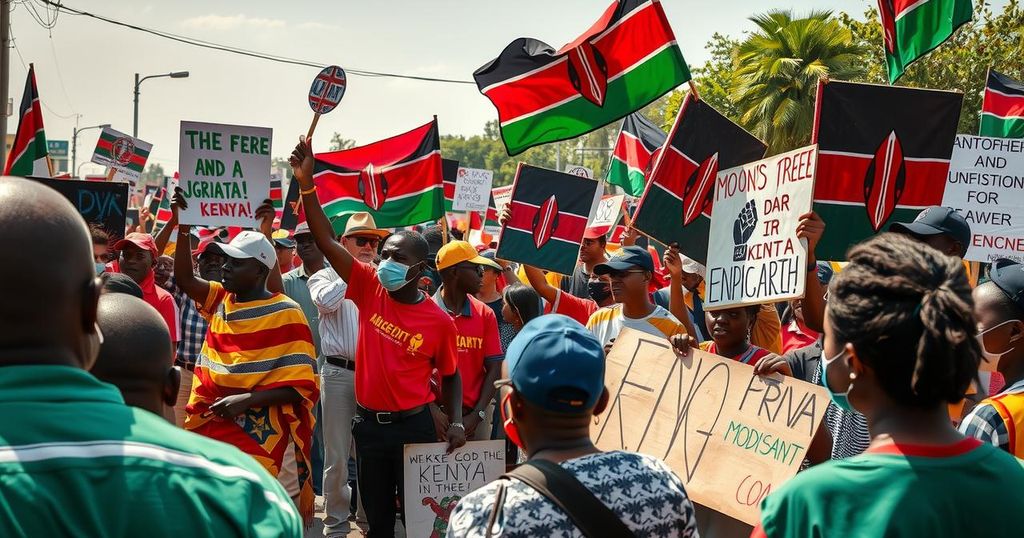Protests Erupt in Kenya Following Activist Albert Ojwang’s Death in Custody
Protests have erupted in Kenya following the death of activist Albert Ojwang while in police custody. Arrested for social media criticism of the police, he died shortly after his detention, which police claim was due to self-inflicted injuries. There are widespread calls for justice and accountability amidst skepticism about the police investigations.
Protests have erupted across Kenya following the tragic death of activist Albert Ojwang while in police custody. The activist was apprehended over the weekend after allegedly criticizing the police on social media, which led to claims that he damaged their reputation. As the country approaches the one-year anniversary of civil unrest over government corruption and tax reforms, anger among citizens is clearly boiling over.
Ojwang’s death came just hours after he was taken into custody. The police reported that he injured himself by banging his head against a wall in his cell, a narrative that his family and supporters vehemently contest. His autopsy was originally slated for Monday but has since been postponed until Tuesday, leaving many awaiting the official results with bated breath. Reports indicate that Ojwang’s father has been waiting for information at the morgue, and doubts linger about the official police account of events.
Julius Juma, the family’s attorney, voiced critical concerns regarding the circumstances surrounding Ojwang’s death. “We do not yet know the exact cause of Albert’s death or who is responsible. If he was arrested for the supposed reasons, why was he placed in solitary confinement?” he questioned. Juma’s inquiry exposed further discrepancies, particularly noting that Ojwang displayed numerous injuries, including a swollen head, hands, and shoulders.
As public outcry grows, several human rights activists gathered at the morgue, demanding justice for Ojwang. Hussein Khalid, who heads the human rights group Vocal Africa, was present at the morgue and expressed his frustration: “We say: ‘enough is enough’. We have lost too many lives at the hands of the police. Whatever the circumstances, no one should die in police custody.”
On Monday, a protest march unfolded in Nairobi, near the Central Police Station where Ojwang died. Some clashes between protesters and police occurred after officers deployed tear gas to disperse the crowd. Amid escalating tensions, police reported that Ojwang was found unconscious in his cell and subsequently declared dead upon arrival at the hospital. In the wake of this incident, police authorities announced that all officers present that night have been suspended to facilitate an investigation led by the Independent Policing Oversight Authority.
Inspector-General Douglas Kanja confirmed that the officers on duty would not be returning until the investigation concluded. Yet amidst the promise of accountability, skepticism persists among activists and citizens. Khalid articulated a fear that justice might not be served: “Until now they have not told us the truth. We want justice for Ojwang and many others who have lost their lives.”
Amnesty Kenya echoed these sentiments, stating that Ojwang’s arrest raises profound questions. They insisted that the findings of the IPOA should be made public and that any implicated officers be held fully accountable for their actions.
Ojwang’s untimely death marks a grim anniversary; nearly a year prior, multiple activists and protesters were killed and abducted by police during protests against a controversial finance bill. Economic dissatisfaction remains pronounced among the populace, despite the government scrapping some proposed taxes last year. Activist Ndungi Githuku highlighted the ongoing struggles, stating, “The joblessness they had last year is tenfold. The killings are still happening. This country belongs to the rich, so it is time for the poor to rise.”
The unrest is reigniting, with Ojwang’s death fueling demands for accountability from the government. Githuku lamented, “This government is actually urging us to come out in the street again. They are saying they will continue abducting and assassinating us. So, we are saying that it’s better to shout and die than to keep quiet and be gotten from our homes while we are quiet.”
Japan continues to hold its breath as the cold reality of another painful chapter in its human rights history unfolds.
Albert Ojwang’s death in police custody has sparked widespread protests across Kenya, reflecting a deep-seated anger over systemic issues of police accountability and government injustices. Activists are demanding transparency in the investigations surrounding his death, questioning the official narratives provided by law enforcement. As people mourn yet another tragic loss, the renewed calls for protests highlight the unresolved grievances still faced by many, reflecting a persistent struggle for justice and accountability within the nation.
Original Source: www.rfi.fr




Post Comment